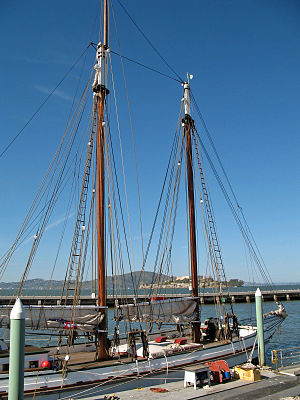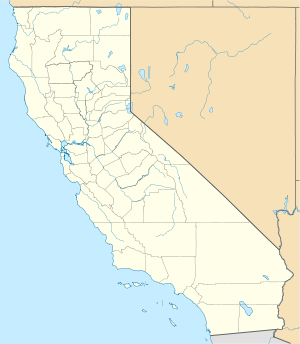Alma (1891): Difference between revisions
Generic1139 (talk | contribs) Use NRHP name in NRHP infobox |
Cyberbot II (talk | contribs) Rescuing 1 sources. #IABot |
||
| Line 101: | Line 101: | ||
== Sources == |
== Sources == |
||
{{reflist}} |
{{reflist}} |
||
* {{cite web |
* {{cite web|url=http://www.nps.gov/safr/local/alma.html |title=Title unknown |accessdate=2005-01-23 |deadurl=yes |archiveurl=http://web.archive.org/web/20050126093927/http://www.nps.gov:80/safr/local/alma.html |archivedate=January 26, 2005 }} |
||
== External links == |
== External links == |
||
Revision as of 00:21, 29 February 2016
 Alma under sail, c. 1900
| |
| History | |
|---|---|
| Builder | Fred Siemer |
| General characteristics | |
| Tonnage |
|
| Length |
|
| Beam | 22.6 ft (6.9 m) |
| Depth of hold | 4 ft (1.2 m) |
| Sail plan | Schooner |
Alma (Scow Schooner) | |
 | |
| Location | 2905 Hyde St. (Hyde St. Pier), San Francisco, California |
| Built | 1891 |
| Architect | Fred Siemer |
| NRHP reference No. | 75000179 |
| Significant dates | |
| Added to NRHP | 10 October 1975[1] |
| Designated NHL | 7 June 1988[2] |
Alma is an 1891-built scow schooner, which is now preserved as a National Historic Landmark at the San Francisco Maritime National Historical Park in San Francisco, California.
History of Alma
Alma is a flat-bottomed scow schooner built in 1891 by Fred Siemer at his shipyard at Hunters Point in San Francisco. Like the many other local scow schooners of that time, she was designed to haul goods on and around San Francisco Bay, but now hauls people. Able to navigate the shallow creeks and sloughs of the Sacramento and San Joaquin River Delta, the scows' strong, sturdy hulls could rest safely and securely on the bottom and provided a flat, stable platform for loading and unloading. While principally designed as sailing vessels, scow schooners could also be hauled from the bank or poled in the shallows of the delta.
Until 1918, Alma hauled a variety of cargo under sail, including hay and lumber. Thereafter she was demasted and used as a salt-carrying barge. In 1926 a gasoline engine was installed, and Alma became an oyster dredger, remaining in this trade until 1957.
While built and operated on San Francisco Bay, Alma is in many ways indistinguishable from scows that were launched and sailed on Chesapeake Bay, the Gulf Coast, the Great Lakes, inland rivers, and other coastal waters of the United States. No scow schooners except Alma are known to survive afloat in the United States.[3]
In 1959, Alma was purchased by the State of California and restoration commenced in 1964. She was added to the National Register of Historic Places on 10 October 1975.[1] In 1988, she was designated a National Historic Landmark.[2][4] She is now one of the exhibits of the San Francisco Maritime National Historical Park and is to be found moored at the park's Hyde Street Pier.
See also
Sources
- ^ a b "National Register Information System". National Register of Historic Places. National Park Service. January 23, 2007.
- ^ a b "Alma (Scow)". National Historic Landmarks Program. National Park Service. Retrieved 2008-02-13.
- ^ "Scow Schooner "Alma"". List of Classified Structures. National Park Service. 17 November 2008. Retrieved 2012-08-23.
- ^ Delgado, James P.; Foster, Kevin J. (1 July 1987). "National Register of Historic Places Inventory-Nomination: Scow Schooner Alma / Alma" (PDF). National Park Service. Retrieved 2012-08-22.
Delgado, James P.; Foster, Kevin J. (1 July 1987). "Accompanying 5 images, from c.1971 and undated" (PDF). National Park Service. Retrieved 2012-08-22.
- "Title unknown". Archived from the original on January 26, 2005. Retrieved 2005-01-23.
{{cite web}}: Unknown parameter|deadurl=ignored (|url-status=suggested) (help)
External links
- San Francisco Maritime National Historical Park
- Schooners
- Museum ships in San Francisco, California
- Individual sailing vessels
- National Historic Landmarks in the San Francisco Bay Area
- Ships on the National Register of Historic Places
- National Register of Historic Places in San Francisco, California
- Ships on the National Register of Historic Places in California
- Fisherman's Wharf, San Francisco

